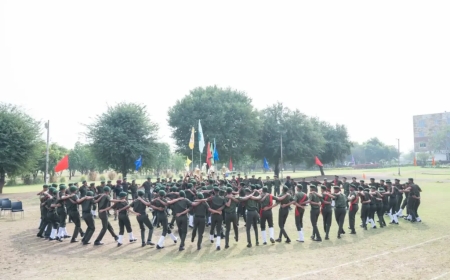Could Pawn to King's End Be the Next Great Screen Adaptation?
Could Pawn to King's End be Hollywood’s next big hit? Explore why this gripping novel has all the makings of a powerful screen adaptation.

In an age where the streaming landscape is dominated by high-stakes thrillers, complex antiheroes, and morally gray plots, the literary world has long served as a reservoir of compelling narratives ripe for adaptation. Among recent standouts is Pawn to Kings End, a critically acclaimed novel thats gaining traction not just among readers but also within Hollywood circles. With its layered storytelling, riveting plot, and emotionally resonant characters, many are now asking: Could Pawn to King's End be the next great screen adaptation?
The answer, based on both literary merit and cinematic potential, leans heavily toward yes.
Rise of Complex Literary Adaptations
The 2010s and 2020s have seen a surge in book-to-screen adaptations that prioritize nuanced storytelling and moral ambiguity. From Gone Girl to The Queens Gambit, audiences have shown a growing appetite for narratives that challenge their perspectives and dig deep into the psychology of their characters. In this context, Pawn to Kings End feels almost tailor-made for the screen.
Its thematic complexity aligns perfectly with this shift. The story doesn't hand the viewer a hero on a silver platter; instead, it slowly unfolds the troubled mind of its central character, Gabriel Vance, a former intelligence officer turned rogue chess prodigy. Haunted by past decisions and navigating a minefield of betrayal, political intrigue, and personal redemption, Gabriels journey resonates with the kinds of internal conflicts that translate well to visual storytelling.
Story That Demands to Be Seen
What makes Pawn to King's End so visually promising is its interplay between high-stakes geopolitical drama and the intimate, personal world of its protagonist. Set across multiple continents and structured like a chess match in narrative formcomplete with openings, middlegames, and endgamesthe novel is a tapestry of layered symbols, turning points, and psychological depth.
Its not just the espionage or cerebral challenges that make it engaging; its the atmosphere. Gritty cities, secret bunkers, dusty borderlands, and elite chess tournaments create a vivid backdrop. Imagine a director like Denis Villeneuve or Cary Joji Fukunaga turning these settings into an atmospheric feast of light, sound, and tension.
But any adaptations strength lies in its characters, and here, Pawn to King's End excels. Gabriel Vance is no James Bond. Hes broken, obsessive, and emotionally torn between loyalty and vengeance. His nemesis, Colonel Roussel, is not a mere villain, but a mirror imageequally damaged, equally strategic, and morally ambiguous. Their dynamic mimics a slow-burning chess match where each move is psychologically calculated. That kind of relationship builds long-term viewer investment, which has proven essential for success in serialized streaming shows.
Genre-Crossing Masterpiece
Another reason why Pawn to King's End holds great promise for adaptation is its genre fluidity. Its not just a spy thriller, nor solely a psychological drama. It dabbles in philosophy, war, cyberintelligence, and even abstract metaphors through chess. This blend broadens its appeal across different audience demographics. The intellectual crowd will appreciate the cerebral themes and symbolism; action fans will get their fix through pulse-pounding missions and chase scenes; and lovers of drama will be captivated by Gabriels internal turmoil and strained relationships.
Moreover, the novel lends itself well to episodic structure. Each chapter concludes with a metaphorical move in the gamesome subtle, others explosive. This pacing aligns seamlessly with how screenwriters build suspense across episodes. Its easy to envision cliffhangers at the end of each installment, with subtle foreshadowing and layered reveals that keep viewers bingeing.
Literary Merit Meets Visual Opportunity
Critics and readers alike have heaped praise on Pawn to Kings End for its sharp prose and intricate narrative. The novel draws clear inspiration from Cold War literature but updates the framework with modern threatscyberwarfare, AI surveillance, and fractured global alliances. Its both timely and timeless, which is a rare combination.
While many thrillers rely on external action, Pawn to King's End builds its tension through internal stakes. Gabriel isnt trying to save the worldhes trying to reclaim his soul. This subtle shift in motivation is what gives the story depth. Its what elevates the source material from a standard espionage novel to something far more profoundand screenworthy.
For those unfamiliar with the novel, a Pawn to King's End book summary reveals the layered plotlines and thematic depth that have already captured the literary worlds attention. Without spoiling too much, the novel follows Gabriels journey from exile to reluctant re-engagement with his past, as he is drawn into a final, high-stakes game that will determine not just the future of nations, but the outcome of his fractured morality.
Challenges of Adaptation
No adaptation is without its hurdles. The novels rich internal monologues, shifting timelines, and intricate chess symbolism may be challenging to render on screen without losing nuance. Theres also the risk of turning a contemplative novel into a standard action-thriller, which would be a disservice to its core themes.
However, recent successes in adapting complex source material suggest that the right creative team could overcome these obstacles. Think of how The Queens Gambit turned a niche subject like competitive chess into a global phenomenon, or how Slow Horses captured the mundane-yet-deadly world of disgraced MI5 agents with biting wit and cinematic flair.
The key will be fidelity not just to plot but to tone. The adaptation must retain the novels philosophical undercurrents and emotional introspection. Visual motifssuch as chessboard color palettes, dreamlike flashbacks, and the juxtaposition of modern technology with ancient strategycould help preserve the depth while enhancing the storytelling.
Who Could Bring It to Life?
Casting and direction will be crucial. An actor like Oscar Isaac or Riz Ahmed could embody Gabriel Vances intellectual intensity and emotional fragility. Directors known for cerebral thrillerssuch as David Fincher or Alex Garlandwould bring the right stylistic gravity to the material. Even a limited series under a Netflix or HBO banner could offer the creative freedom needed to explore the storys nuances over eight to ten episodes.
A high-quality score, perhaps from composers like Hildur Gunadttir or Max Richter, could amplify the emotional stakes and lend the show a haunting, reflective tone. Done right, Pawn to Kings End could become both a cultural hit and an awards-season darling.
Final Move
Ultimately, Pawn to King's End is not just a book it's a blueprint. A blueprint for character-driven drama, psychological complexity, and global intrigue. It offers everything modern audiences crave: flawed characters, gripping suspense, thought-provoking themes, and a stylistic foundation perfect for television or cinema.




























